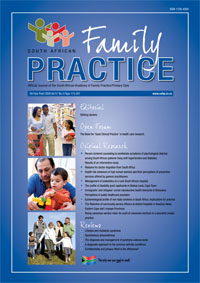Immigrants' and Refugees' Unmet Reproductive Health Demands in Botswana: Perceptions of Public Health Providers
Keywords:
Contraceptive, immigrants, refugees, doctors, nurses, health providers
Abstract
Background: The health care of Botswana (citizens of Botswana) as indicated in the country’s VISION 2016 is uppermost in the priorities of Government of Botswana, yet Botswana’s National Health Policy, the Immigration Policy, and the National Sexual and Reproductive Health Programme Framework all are silent on the obligations of the government for providing health services for the immigrant and refugees population. In view of the high prevalence of HIV/AIDS in Botswana, South Africa and other sub-Saharan countries, it is critical that reproductive health services be as affordable and accessible for this population as they are for others in Botswana. This study, therefore, has measured the views of the primary health care providers in Botswana on the perceived reproductive health needs of immigrants and refugees, the availability and accessibility of reproductive health care services to the immigrant and refugee population in the country. This information will be necessary for policy makers, Government of Botswana and the private sector to shape interventions measures to assist immigrants and refugees seek and access their desired reproductive health services. Methods: The study targeted all the 4, 667 medical doctors and nurses who were serving in various hospitals and clinics in 23 health districts of Botswana at the time of this study. Using NCS Pearson statistical software, the sample size for the study was determined to be 851. This estimated sample size was allocated to the 23 health districts (strata) using probability proportional to size (PPS). Having obtained the sample size for each district, the health providers to be interviewed from each health district were selected randomly and in proportion to the number of doctors and nurses in each district. Questionnaires were administered to these health providers by research assistants, who explained the purpose of the study and obtained informed consent. The questionnaires were coded to ensure anonymity of the respondents. The questionnaire contained questions about the health care providers’ demographic characteristics, their opinions on the reproductive health needs of immigrants and refugees, and their views on factors that influence accessibility of these services to immigrants and refugees. The fieldwork ended collecting data from 678 doctors and nurses (about 80% of the targeted sample). Results: Majority of the health providers indicated that the most important reproductive health needs of the immigrants and refugees, namely, pregnancy related (Prenatal, Obstetrics, Postnatal conditions), STI treatment, HIV/AIDS treatment and counseling, and family planning were not different from those of the locals. However, some major differences noted between the local population and the foreigners were (i) that ARV treatments and PMTCT were never accessible to the non-citizens; (ii) that while treatments and other health services were free to Batswana (citizens of Botswana), a fee was charged to non-citizens. Although 86% of the 21 studied reproductive health services were available in the health care system more than 50% of the time, only 62% of them could be accessible to the immigrants and refugees 50% of the times. The major reasons for inability to access these services were: (i) The immigrants and refugees have to pay higher fees to access the reproductive health services (ii) Once an immigrant or refugee is identified as HIV positive, there are no further follow-ups on the patient such as detecting the immune status using CD4 count or testing the viral load (iii) The immigrants and refugees do not have referral rights to referral clinics/ hospitals for follow- ups in case of certain health conditions (iv) The immigrants and refugees are required to enlist in the Medical Aids scheme which can help offset part of the costs for the desired services. Conclusions: The study recommended an improved availability of reproductive health services to the immigrants and refugees and the expunging of laws and practices which made it difficult for immigrants and refugees to access the available reproductive health services.
Published
2009-04-25
Section
Original Research
By submitting manuscripts to SAFP, authors of original articles are assigning copyright to the South African Academy of Family Physicians. Copyright of review articles are assigned to the Publisher, Medpharm Publications (Pty) Ltd, unless otherwise specified. Authors may use their own work after publication without written permission, provided they acknowledge the original source. Individuals and academic institutions may freely copy and distribute articles published in SAFP for educational and research purposes without obtaining permission.

